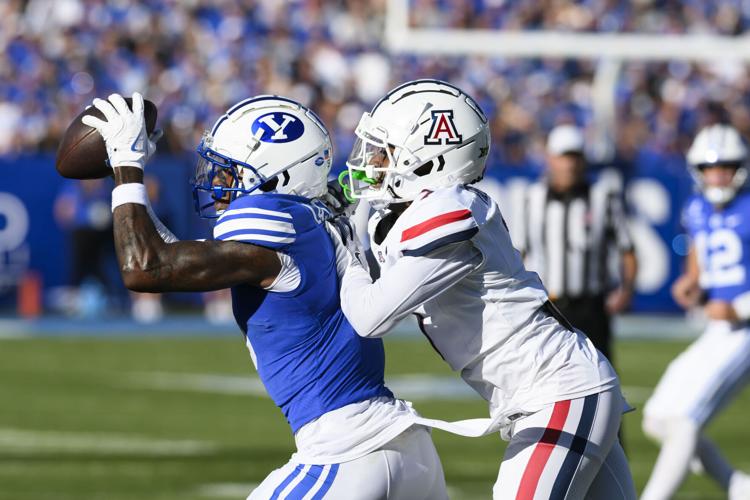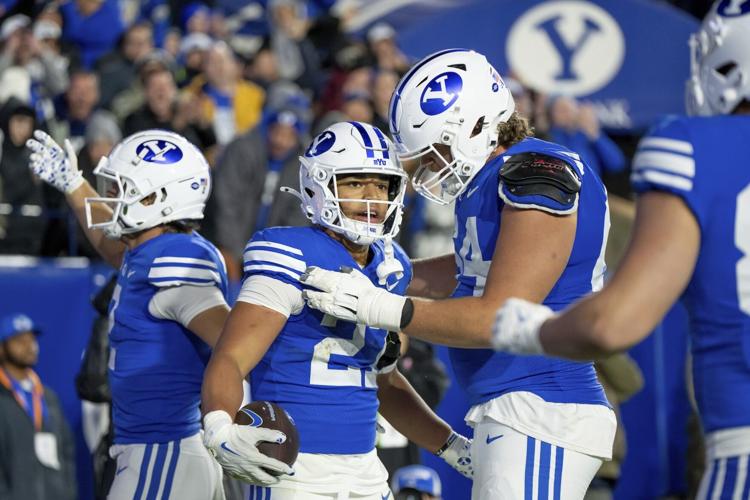Within the yammering and debate that unfolded Tuesday afternoon during the College Football Playoff rankings reveal, one utterance should have resonated deeper than all others from Morgantown to Orlando and Tucson to Salt Lake City.
"I think the Big 12's only getting one team in," ESPN analyst Greg McElroy said.
That one team, of course, would be the conference champion.
Talk about bad math: There are seven at-large berths available in the 12-team playoff, five weeks remaining and four Big 12 teams in the selection committee's rankings.
The conference's fate could not possibly be sealed.
And yet, McElroy's observation made perfect sense given the placement of Big 12 teams relative to peers from other conference:
• BYU (8-0) has two wins over ranked opponents (SMU and Kansas State), yet the ninth-ranked Cougars are five spots behind Miami (9-0), which has one win over a ranked opponent, and four spots behind Texas (7-1), which has zero wins over ranked opponents.
• The Cougars, who have the No. 61 strength-of-schedule, were one spot behind Indiana (9-0), which has the No. 103 schedule and, ahem, no wins over ranked opponents.
• Iowa State (7-1) was No. 17 — behind four SEC teams with two losses. The group includes Mississippi, which lost to Kentucky (3-6). Iowa State's lone loss is to Texas Tech (6-3).
The Big 12's poor relative position in the CFP rankings comes despite its placement in the well-regarded Sagarin power ratings — it's the No. 2 conference, ahead of the Big Ten — and its 2-2 record against the SEC in head-to-head competition.

BYU wide receiver Darius Lassiter, left, makes a catch for a first down while defended by Arizona defensive back Demetrius Freeney, right, during an NCAA college football game Saturday, Oct. 12, 2024, in Provo, Utah.
All of which leads us to wonder if McElroy's observation is accurate.
If the Big 12's fate is sealed 31 days before the final rankings are released.
If the pathway to a second bid is blocked.
If the absence of big-brand schools in the Big 12 led to a bias against the conference, especially with regard to its only undefeated team, BYU.
An additional piece of evidence suggests that is, in fact, the case.
Of all the metrics deployed by the selection committee, few are more influential than strength-of-record, which compares a team's record to that of an average Top 25 team facing the same schedule (and is published by ESPN).
The disparity between the Cougars' strength-of-record and their position in the committee's rankings is greater than that of any other team in the top 12, and it's not even close.
BYU's strength-of-record is No. 4, behind only Georgia, Oregon and Miami.

BYU running back LJ Martin, second from left, celebrates after scoring a touchdown in the second half of an NCAA college football game against Oklahoma State, Friday, Oct. 18, 2024, in Provo, Utah.
But the Cougars are No. 9 in the rankings, a difference of five places.
No other team in the top 12 is ranked more than two spots below its strength-of-record position.
No. 4 Miami, No. 8 Indiana and No. 11 Alabama are ranked one spot below their strength-of-record placement, while No. 3 Georgia is two spots below its strength-of-record placement (No. 1).
Meanwhile, No. 10 Notre Dame, which lost to Northern Illinois — and has a lower strength-of-schedule ranking (75th) than BYU (61st) — is five spots higher in the rankings than its strength-of-record placement.
What do the Irish have that the Cougars don't? Hmmmm.
To be clear, BYU's ranking isn't necessarily a fixed existence, but the Cougars could have trouble climbing more than one or two spots. Their final four games are against unranked opponents (Utah, Kansas, ASU and Houston) that have a combined record of 16-17.
Which brings us back to the original premise: The Big 12 looks destined for one bid.
Why? Because the Cougars are lower than they should be, because they don't have enough juice in their schedule to make material gains and because the treatment they have received thus far seemingly makes them vulnerable to a steep drop if they lose once.
In other words, the Cougars will make the CFP as an automatic qualifier if they win the Big 12 title but probably won't clear the bar for the at-large pool if they don't.
Meanwhile, No. 17 Iowa State, No. 19 Kansas State and No. 20 Colorado are so far down the rankings that their only access to the CFP would come as automatic qualifiers, with a Big 12 title in tow.
From their current positions, they cannot possibly reach the top 12 with another loss on their resumes.
It's too far to climb with too many teams ahead of them, including four two-loss teams from the SEC.
We have witnessed some wild plot twists so far. Who figured Army would be undefeated or Vanderbilt would topple Alabama?
But based on the committee's placement of BYU and the Big 12's other ranked teams, a second CFP bid seems unlikely at this early stage.





